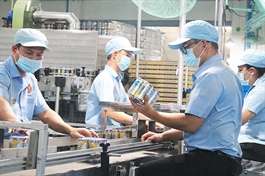Viet Nam needs a policy corridor to promote circular economy
Viet Nam needs a policy corridor to promote circular economy
While the circular economy has become a trend in developed economies, it could also be implemented to develop Viet Nam if there is an appropriate legal and policy corridor, said experts.

At the COP26 Climate Change Summit last year, Prime Minister Pham Minh Chinh said the country would develop and implement strong emission reduction measures to achieve net zero emissions by 2050.
Minimising the amount of plastic waste discharged into the environment every year is among the solutions that harmonize the interests of businesses and consumers, the experts said.
A circular economy is a concept first used by David Pearce and Kerry Turner in 1990 to refer to a new economic model based on the basic principle of "everything is an input to something else."
Under the circular economy mechanism, all the waste output of an industry should be put into an input resource of another industry or internally circulated within a business. The circular economy contributes to adding value to businesses, reducing resource exploitation, reducing waste treatment costs, and minimizing environmental pollution.
According to Future Planet, the circular economy should be a trend for everyone because of its outstanding advantages. The first strong point of the circular model is it drives the economy up. Research conducted by Accenture shows that the circular economy could generate an additional US$4.5 trillion in economic output by 2030 through job creation and innovation.
According to experts, by switching to a circular model, businesses use less raw materials and have more recycled products. This reduces your reliance on volatile raw material prices and supply chain disruptions, while increasing resilience and gaining a competitive edge over traditional linear models.
Most importantly, the circular economy creates a shield that prevents plastic waste from being discharged directly into the ocean. The solution of delegating plastic recycling to companies and craft villages is currently unsustainable and unsystematic because the daily volume of plastic waste is much larger than the current waste treatment capacity in Vietnam.
Therefore, only when manufacturing enterprises establish their own models of recycling plastic waste can the amount of plastic bags and bottles discharged into the environment be controlled and reduced.
In Viet Nam, the circular economy model has been applied in some enterprises in the field of consumer goods and the packaging industry, which joined hands to form the Viet Nam Packaging Recycling Alliance (PRO Vietnam).
According to the roadmap, large businesses will have to implement producer responsibility (EPR), which is designed around the polluter pays principle. The manufacturer is responsible for managing the products after they become waste, including collection and treatment, reuse and recovery, including recycling and energy recovery, instead of just having a production role and ignoring the waste.
Experts think it is a breakthrough step towards a circular economy instead of the traditional linear economy. However, an important factor to open the door to the circular economy is to develop appropriate policies and legal corridors, creating conditions for businesses to fulfill their obligations to the environment.
Nguyen Quang Vinh, Vice President in charge of the Vietnam Chamber of Commerce and Industry (VCCI), said: "Vietnam already has policies related to the circular economy in a number of current laws. However, in order to really create a solid foundation for the circular economy so it can "take off", it is necessary to develop a separate circular economy law."
Vinh said passing the Circular Economy Law is essential to facilitate, support, attract and call for the participation of many economic sectors and localities in the transition to a circular economy model.
Vinh said a full legal corridor will facilitate businesses to access capital support mechanisms, issue green bonds, access technology, and build markets for products manufactured according to the model of circular business.
As consumer demand for green, environmentally friendly products are increasing, investors will also consider it as a standard in the business evaluation process, so the application of the circular model will have more advantages in attracting capital, said the VCCI leader.






















